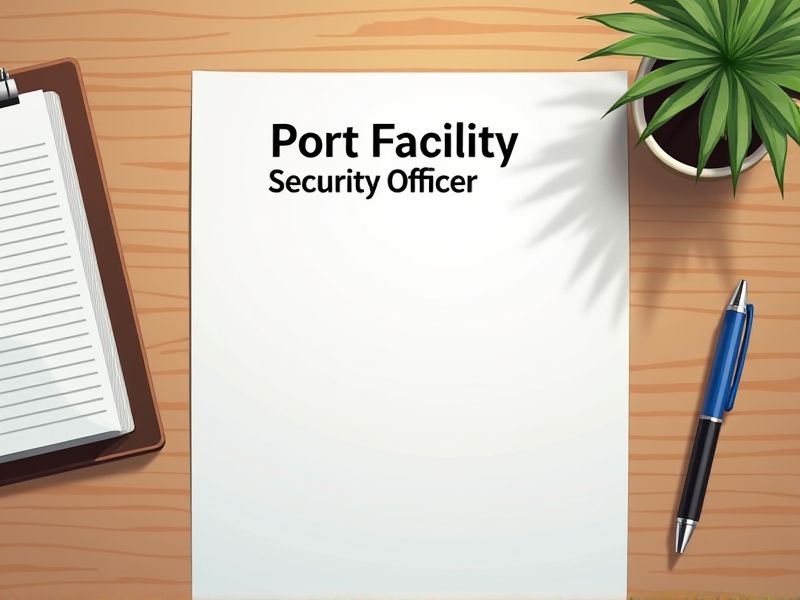
Port Facility Security Officers are pivotal in safeguarding port environments and ensuring compliance with international maritime standards. With diverse threats ranging from terrorism to smuggling, possessing specific certifications equips them to handle complex security scenarios efficiently. Certifications provide them with the necessary expertise in risk assessment, cybersecurity, and emergency response. Below are several essential certifications you may require to become a Port Facility Security Officer.
Transportation Worker Identification Credential (TWIC)
The Transportation Worker Identification Credential (TWIC) enhances security by ensuring only authorized personnel can access secure areas within port facilities. Port Facility Security Officers (PFSOs) need a TWIC to perform thorough security assessments without delay or restriction. By holding a TWIC, PFSOs efficiently coordinate responses to potential threats, enhancing overall port security. Relying on TWIC helps streamline identification processes, thereby reducing vulnerabilities in the security infrastructure.
ISPS Code Training Certification
The ISPS Code Training Certification is necessary for a Port Facility Security Officer to ensure compliance with international maritime security standards. Training equips the officer with skills required to assess threats and implement appropriate security measures. The certification also validates the officer's capability to coordinate effectively with port stakeholders, enhancing overall port security. The training fosters a proactive security culture, reducing risks of illegal activities such as smuggling or terrorism.
Facility Security Officer (FSO) Certification
FSO Certification ensures a Port Facility Security Officer is equipped with the knowledge to manage risks and protect assets effectively. It aligns the officer's expertise with international maritime security standards, fostering safe port operations. By obtaining certification, an officer gains credibility, which enhances stakeholder trust and collaboration. Certified officers also demonstrate preparedness to respond to security threats, ensuring continuity and safety at the port.
Maritime Transportation Security Act (MTSA) Training
Maritime Transportation Security Act (MTSA) training is essential for Port Facility Security Officers to understand the regulations and security measures required to safeguard port operations from potential threats. This training equips officers with the skills to conduct thorough risk assessments and implement effective security plans, reducing vulnerabilities in maritime infrastructure. Effective training ensures officers can respond promptly to security breaches, mitigating potential impacts on cargo and passenger safety. Consistent MTSA training compliance helps maintain international trade credibility by aligning port security protocols with global standards.
Port Facility Security Plan (PFSP) Training
Port Facility Security Plan (PFSP) Training equips Port Facility Security Officers (PFSOs) with the essential skills to identify and mitigate potential security threats, ensuring port safety. This training aligns with international maritime security regulations, enhancing compliance and readiness. Effective PFSP training enables PFSOs to coordinate and communicate efficiently with stakeholders during security incidents. Training fosters proactive security management, reducing the risk of disruptions and safeguarding port operations.
Emergency Response and Crisis Management Certification
The certification ensures that Port Facility Security Officers are prepared to handle emergencies, reducing the potential for operational disruptions. Trained officers can effectively coordinate with emergency services, minimizing response time and mitigating risks. The knowledge gained from certification empowers officers to develop and implement comprehensive security plans, enhancing the facility's safety standards. The certification also provides credibility and compliance with international maritime security codes, fostering trust with stakeholders.
Incident Command System (ICS) Certification
The Incident Command System (ICS) certification equips a Port Facility Security Officer with standardized emergency management skills, enabling effective response coordination during crises. A certified officer enhances communication and collaboration with other agencies and responders, reducing the risk of misunderstanding and procedural errors. The system's scalable structure allows for flexibility, crucial in addressing varying levels of port security threats. Understanding ICS principles ensures compliance with national and international security regulations, which is essential for maintaining operational integrity.
Certified Protection Professional (CPP)
Certified Protection Professional (CPP) enhances a Port Facility Security Officer's expertise in identifying and mitigating security threats. The advanced training and knowledge gained from CPP accreditation improve the officer's capability to manage complex security operations. CPP certification instills trust and credibility among stakeholders, ensuring compliance with international security standards. With the CPP credential, security practices at ports become more aligned with global best practices, reducing potential vulnerabilities.
Cybersecurity Awareness Certification
Cybersecurity Awareness Certification equips Port Facility Security Officers with knowledge to identify and respond to cyber threats, crucial for safeguarding sensitive maritime data. Increased understanding of digital vulnerabilities helps in implementing effective security protocols, reducing the risk of cyber-attacks. With the rise of cybercrime targeting maritime operations, certification ensures compliance with international security standards, fostering safer trade routes. Expertise in cybersecurity further enhances a port facility's reputation, reassuring stakeholders of commitment to robust security measures.
Certified Maritime Professional (CMP)
A Certified Maritime Professional (CMP) ensures a Port Facility Security Officer possesses advanced knowledge of maritime security protocols and regulations. With CMP certification, officers are better equipped to handle security threats, reducing the risk of breaches at the port. The certification provides specialized training that enhances the officer's ability to develop and implement effective security plans. This formal recognition often leads to improved stakeholder confidence in the port's security management.
Summary
When you obtain certifications as a Port Facility Security Officer, you can expect enhanced security management skills leading to better incident prevention. This improvement in skills directly contributes to maintaining compliance with international security regulations, reducing the risk of penalties. Your credibility and professional standing in the maritime security field are likely to increase, facilitating career advancement opportunities. These certifications can result in more effective coordination with law enforcement and security agencies, strengthening overall port security.
